
APAPA俄亥俄暑期实习生项目旨在帮助高中生和大学生成长为未来的领导者,向本州所有青年学生开放。这个独特的机会着力培养和发展亚裔青年的领导技能,帮助他们获得政府工作经验,了解行政、立法、公共事务等政府职能,成为积极参与公共事务的优秀公民,并有与其他实习生交流的机会。今年在克利夫兰、哥伦布和辛辛那提,共有24个高中生和大学生参加了这个项目。6月21-23日,其中5名实习生在APAPA俄亥俄领导丘红和殷艳玲女士的带领下,参加了赞助机构CLUSA在加州举办的全国大会。下面是这五个学生写的活动总结和感言(英文)。
2019 CLUSA National Conference
As a grantee of CLUSA Summer Internship program, APAPA Ohio was invited to
attend the 2019 CLUSA National Conference at Santa Clara University. Two adult
leaders from Columbus, two interns from Columbus, two interns from Cincinnati,
and one intern from Cleveland were lucky enough to spent the evening of June
21 to the early afternoon of June 23 at the National Conference, to learn from
each other and to build long lasting friendships.
The following are reflections from the 5 participating interns: Alan Guo,
Jason Zhang, Norah Xu, Craig Qi and Hannah Qin.
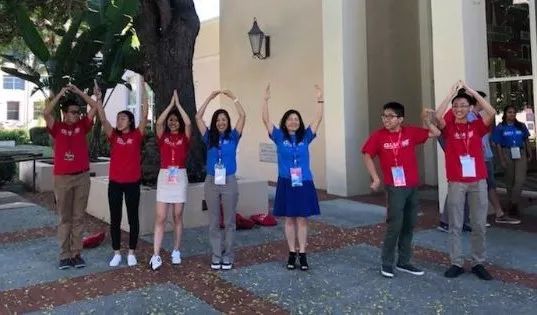
APAPA Ohio Team Forming “OHIO USA”
CLUSA Internship Recollection
by Alan Guo
Upon hopping off the Uber to Santa Clara University, I froze. The paved-black
road before me was littered with vibrant flowers and pastel-purple petals
fluttering from the trees above, all shining brilliantly underneath the
California sun—for a moment, I stood in awe at the picturesque scene before
me. California certainly was no Ohio.
And my very next thought was, “where’s the food?”—after two transfers, riddled
by delays and rescheduled flights, I was absolutely famished. I scrambled to
Locatelli, praying that dinner hadn’t started yet (I was an hour late).
I hate to admit it, but when I arrived at Locatelli, I was more excited about
the Bay Area than the actual CLUSA Internship Conference itself. I was highly
skeptical about how much I could learn from what was basically a 1.5-day
event—I saw the whole thing as more of a Bay-Area field trip instead of a
leadership-development retreat. But despite my doubts, I was hopefully
optimistic—it wasn’t every day that I get the chance to fly down to California
to spend a weekend alongside other talented interns for free.
And I thankfully could not have been more wrong. To say that CLUSA 2019 was
eye-opening is an understatement—from learning about shower-claps to the
ballroom vs. the balcony, we didn’t just learn about leadership techniques at
CLUSA; we learned how to think critically. By examining our own perspectives
and how they were formed by our surroundings, CLUSA highlighted the power of
introspection, analysis, and being vulnerable—lessons that I am forever
grateful for. And from late-night talks with my roommate to breakfast chats
about Pokemon Go, I’m so thankful for the new friends that made it so hard for
me to say goodbye. It all went by so fast—I soon found myself hungry for more
time with people whom I had just met, but I felt like I had known for years.
On the last day, Anthony described leadership excellence as “expressing your
best self to inspire others to be their best selves, and serving others before
yourself”. Because as I sat on the Uber back to San Jose Airport, it dawned on
me—CLUSA was never about leadership, internship experience, or impacting our
community. It was about how to lead our lives—the leadership experience and
success will come along the way.
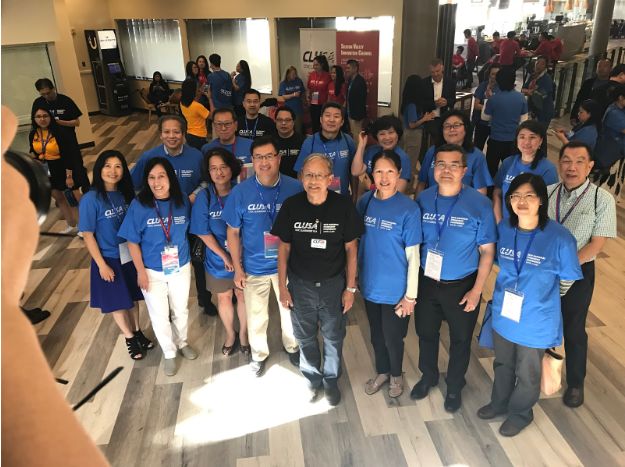
Leadership Excellence
by Jason Zhang
The CLUSA National Internship Conference at Santa Clara University featured
multiple guest speakers who talked not only about their Asian roots but also
of their “life story”. Some mentioned interning where respect for menial tasks
prepares an individual to handle bigger ones. Meanwhile, others discussed
being a public servant where a clear vision and a sense of integrity in work
are key. However, at the end of each speaker’s life story, the conference
trainer would ask “what is leadership excellence?” Despite the broad question
and different backgrounds of the speakers, they all gave an answer that shared
a similar theme.
So what is leadership excellence? A few speakers defined it as the lack of
fear in challenging situations. Anyone working to become or who currently is a
leader will obviously face challenges due to their responsibilities. However,
with a fear of failure comes an impossibility for success as taking managed
risks and learning from mistakes is the only way for both the individual and
the entire world to change for the better.
Along with a lack of fear, another speaker also added that leadership
excellence was the ability to understand what one is talking about. Too often
many have viewed leaders as incapable of understanding the problems of the
people they lead. Consequently, distrust and a disconnect forms between the
two. Therefore, it is essential that a leader connects with people in order to
truly understand a situation and hopefully discover a practical answer.
A different speaker also analyzed the question on a personal level, answering
that leadership excellence is to first of all be a leader for one’s self in
order for an individual to be better than they were yesterday. This originates
from the idea that you know yourself best. As a result, you out of everyone
else know what you can do to improve. Only by recognizing what one can improve
on can someone learn to recognize what society needs to improve on.
All of these responses focused on the importance of finding solutions to
current problems. Not only do we have to have a will to solve them, we need to
actively search for a way to solve them. One of the speakers put it best by
saying “we go in not knowing the answer but we will always find one.” A will
to solve problems despite its challenges exemplifies the importance of
leadership excellence in a community that has typically remained quiet in the
face of challenge. This conference certainly demonstrated that we can have a
voice. Only by creating a voice that can move can we create moving change.
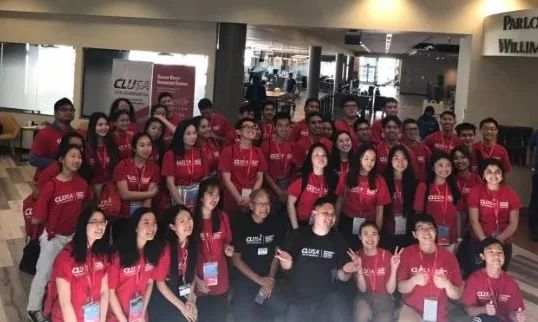
Meeting New People
by Norah Xu
Stepping into the room where the CLUSA Leadership Conference felt like a
breath of fresh air. Other than to attend math club, I had never seen so many
other Asians gathered in one place. It amazed me that there were people from
around the country that were just like me: they cared about civic engagement
and leadership.
However, my Mom had decided it would be a good idea for us to go sightseeing
around the area before the conference began, despite the fact that our little
detour would render us about half an hour late. When I entered the room, the
Welcome Dinner had already begun and everyone had already gotten to know each
other. I missed it, the most crucial part – meeting new people. When I looked
around for familiar faces, I saw none, and my heart began to race. How was I
to make friends when everyone had already gotten to know each other?
My eyes scanned the room and I eventually found Hannah, my longtime friend and
fellow member of the APAPA Columbus Youth Chapter. I pulled up a chair at her
table and quickly returned to the table after getting food, desperate to catch
up on what I had missed. I looked around at the faces around me, everyone
laughing as if they were already friends. I couldn’t help but feel
intimidated.
I thought I had missed my opportunity to make friends, but at that moment I
realized the conference had only just started. Every single person around me
was a new opportunity, a new opportunity to introduce myself and a new
opportunity to gain a friend. Over the course of the weekend, I got to know
people, little by little.
On the second day, Anthony Le, Executive Director of APALI, our youth leader
training lead, had us discuss deep themes with each other. One of his
questions was, “What aspect of your identity makes you the most
uncomfortable?” One boy who was around the same age as I was raised his hand.
He talked about how recently, his father lost his job, which resulted in
economic strain on his family, and how his friends even made fun of him for
not owning a car. Another boy talked about his challenges attending a Catholic
school as an atheist and the difficulties that it presented him. Seeing people
that were around the same age as me experience such different paths of life
led me to reflect on my own as well.
Another common theme, unsurprisingly, was the Asian-American identity, and the
expectations and guilt placed upon the shoulders of the youth. Together, we
talked about our struggles, triumphs, and unfulfilled desires as Asian
Americans. In those moments, I felt truly connected to the others in the room,
as we bonded through our shared experiences, however small or large they were.
At the end of the day, no matter someone’s background or beliefs, we were all
united as Asian Americans who just wished to make a difference in this world.
I entered the conference on the first day to a roomful of strangers and
emerged with countless friends I will stay connected with for a lifetime. Our
unity, as well as our differences, have inspired me to strive to be a better
person and truly appreciate my own unique identity.
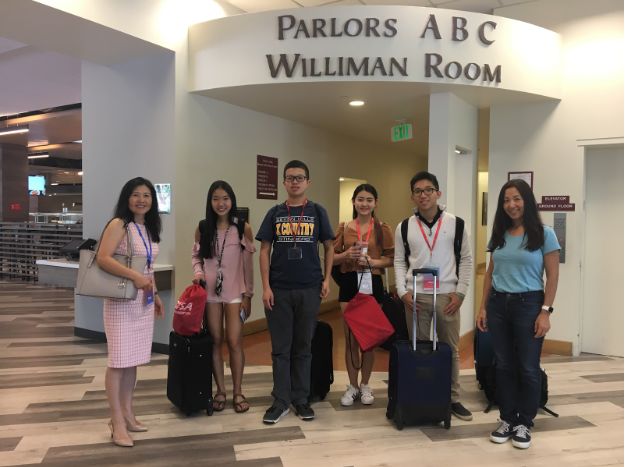
Today’s Learners, Tomorrow’s Leaders
by Craig Qi
Sponsored by Civic Leadership USA (CLUSA), the 2019 National Internship
Conference was held at Santa Clara University; the conference consisted of 54
high school and college interns from all over the country.
The most enjoyable part of the conference was the social networking experience
because meeting new people is a challenge that requires stepping out of one’s
comfort zone. Upon checking in, I immediately realized that everything was
designed to push ourselves to meet new people through the room assignments,
workshops, and leisure time.
First, the room assignments were designed so that you would share living
quarters with someone from another group. This experience required you to
learn how to stay with a different person through a mindset of curiosity,
compromise, and understanding.
Second, the workshops promoted social and networking skills with powerful
icebreakers and a welcoming atmosphere with core beliefs that encourage
curiosity over judgment. The first workshop was oriented in a seminar-like
setup. We spent about three hours in this seating arrangement as we discussed
icebreakers, “attention-getters,” listened to several guest speakers describe
their journey from intern to leader in the workplace and community. The most
enjoyable activity was the “Leadership Walk,” where the main objective was to
keep a conversation going while exploring the college campus. Finally, during
our leisure time, I explored some local attractions with the people that I met
during the workshops.
Overall, I learned to live in the moment. Throughout this meaningful
conference, I realized that you should not have expectations; instead, you
should put your faith in the idea that everything will be alright. Looking
back, I feel that the most significant challenge was parting. As a wise man
once said, “Lessons leave, and stories stay.” Although my stories of midnight
ice cream raids, getting kicked out of The Apple Store, and the endless
laughter throughout Paranoia will stay behind in San Jose, these newfound
friendships will not leave and return home with me.
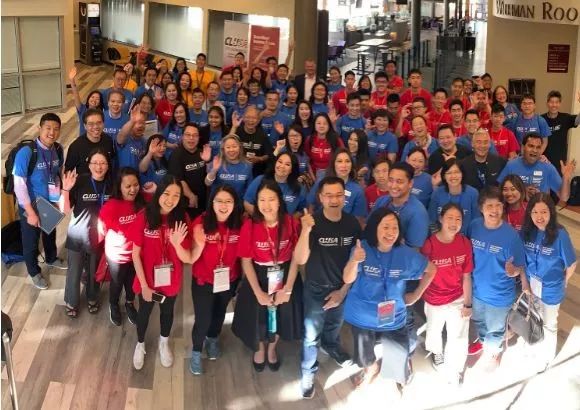
CLUSA National Leadership Conference
by Hannah Qin
In this past week, I was blessed with the opportunity to attend a national
leadership conference with other Asian Americans all across the nation. After
returning back to Ohio, I reflected on my experience in California, and as a
result, not only did I learn much about myself, but also about others.
The first day when I arrived at the dinner reception, the room full of people
who looked like me appeared as a typical Asian gathering that would take place
in my privileged, suburban hometown in Dublin, Ohio, where everyone was like
me, who was living in a bubble of friends, grades, and neutrality. However, as
the days went on, I quickly realized that I had finally broken out of the
“Dublin Bubble”.
Various activities aided in my realizing this. The most prominent and
impactful one was one where Anthony asked us a question regarding how we, as
Asian Americans, view ourselves, and we stand in different groups according to
our answers. The groups were labeled as Gender/Sexuality, Ethnicity, Religion,
Age, Economic Status, and Disability.
One of the questions was, “Which category are you most sure about yourself?”
The question seemed simple enough to answer, yet took me a long time to choose
between ethnicity and gender. Both were God-given and I’ve lived with both my
entire life, so I am sure about both, but I had to choose one.
If you had asked me if I was sure about my ethnicity, I would’ve said yes. If
you had asked me if I was sure about my gender, I would’ve also said yes. But
if you ask me which one I am more sure of, it would be difficult, but I would
choose gender. Why? I don’t know. I didn’t like my answer, but the truth is
the truth. It is what it is.
This question made me realize that I am not as sure in my ethnicity as I
thought and hoped I was.
Another question was, “Which category are you the least comfortable with?”
This question, although relatively easy for me, proved hard for others to
choose and speak up. One brave soul raised his hand to explain after choosing
the economic status group. He explained that his family was not economically
stable, and this caused a big turn in his life which made him completely
different from the others.
This question made me realize that not every Asian-American across the country
followed the general Asian trend of living in a privileged community, that not
every Asian-American is like me, whether economically or any other aspect.
These two realizations both helped me come to a conclusion that although there
are many different types of Asian-Americans, whether differentiated by
religion, age, gender, sexuality, or even social class, we all have to come
together, united by race, to create a change in society where Asian-Americans
are not only more engaged in the civic process, but also comfortable with
their race. We need to be active to actually progress. To do this, I need to
feel comfortable in my own skin and make others feel comfortable around me and
each other. This change must start with leadership from within the Asian
community, which starts with confidence and assurance. I need to take
initiative and make this change happen.
关于CLUSA
The Civic Leadership USA is a 501(c)(3) incorporated in Washington DC in 2013.
It was the vision of Mr. Sandy Chau, chairman of the board. The Foundation is
headquartered in San Mateo California.
Our main objectives are to empower and organize the Asian American
communities, to create a national network of civic-minded organizations and
leaders and work in unity.
Train, connect, collaborate, empower and unite civic leaders and local
organizations in the USA.
The principal activity of CLUSA is to sponsor Civic Leadership Forums aimed at
training Asian Americans to participate in the political process and our civic
life. The Forums are non-partisan and inclusive of all Americans regardless of
ethnic group or country of origin.

【编者按】 本文所有图片均由作者提供或来自网络。如存在版权问题,请与我们联系。更多精彩文章,请查看我们公众号的主页。欢迎大家积极投稿!